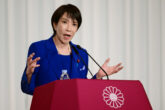July 18, 2014
In Japan’s defense change, context is everything
WASHINGTON/HONOLULU – The announcement by Japan’s government that it will reinterpret the country’s constitution and permit a greater range of military activity has evoked reactions across the spectrum. From outright opposition in Beijing and suspicion in Seoul, to unqualified support in Washington and Canberra, Japan’s historic shift has sparked vigorous debate across capitals in Asia and beyond.
And while the decision to permit the Japanese Self-Defense Forces (SDF) to engage in collective self-defense represents a landmark moment in the country’s security maturation, Tokyo’s next steps will be more important still. In setting the domestic context for Japan’s new military roles, its leaders’ stance on historical issues will help determine how far its neighbors and partners will go toward supporting or opposing its security evolution.
Strictly speaking, the reinterpretation is unlikely to change very much in practice, at least in the near term. Depending on the legislation, the SDF will be able to aid the defense of allies or partners if they come under attack, but the conditions under which this can be done are restrictive. The situation must pose a clear threat to Japan — not only to a besieged ally — it must be the last resort, and the use of force is limited to the minimum necessary to protect the Japanese people. Prime Minister Shinzo Abe has ruled out Japan’s involvement in foreign wars, and SDF troops would not deploy to the Korean Peninsula in a contingency without prior consultations with Seoul. The Constitution’s Article 9 — which prohibits Japan from employing force to resolve international disputes — has not changed.
More from CNAS
-
Japan’s Iron Lady: A Prime Minister for the Trump Era?
This article was originally published in The Diplomat. A protégé of Abe Shinzo, newly elected Liberal Democratic Party President Takaichi Sanae inherits her mentor’s approach...
By Ryan Claffey
-
America and Japan in a Post-INF World
How long do estimates suggest it would take the People’s Liberation Army Rocket Force to destroy all major U.S. air, naval, and logistics bases in Japan? Some have argued that...
By Eric Sayers & Sugio Takahashi
-
Quad Restrictions: Addressing PRC Investment Concerns in the Indo-Pacific
Washington has recently taken a tougher tack to growing inbound investment from the People’s Republic of China (PRC) by strengthening the Committee on Foreign Investment in th...
By Ashley Feng & Sagatom Saha
-
Indo-Pacific Security / Technology & National Security
For Japan, a Winning Formula is Cyber Defense and Innovation OffenseThe already great and increasing importance of the cyber domain in strategic competition makes the need for Japan to advance its cyber-security and technology entrepreneurship...
By Krista Auchenbach & Daniel Kliman


